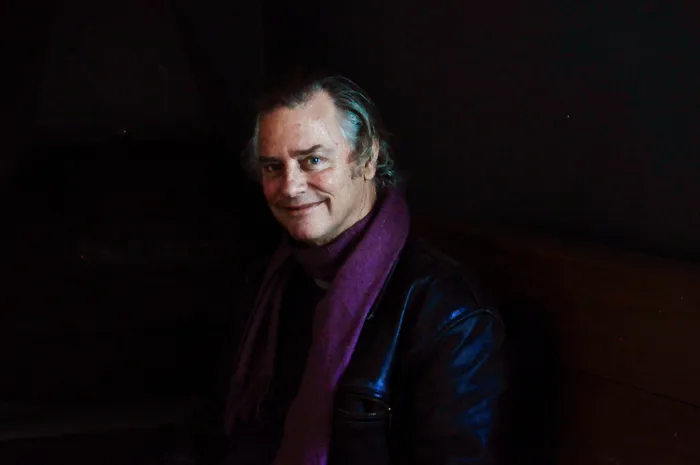Muizenberg muso Robin Auld talks music, poetry and surf

Robin Auld jokes that Fish Hoek is like the Eagles song: you can check out any time you like, but you can never leave.
Despite not having been born here, Robin Auld both embodies and wears the peculiarities of his home country like a bespoke veldskoen.
Born in Zambia to a British mom and Scottish dad, Auld’s childhood was wilder than most. His memories include having people keep watch for crocodiles while he played on the riverbanks.
He was 10 when he landed in Cape Town with his younger brother and his mom. Fresh off the boat, they lived in Devil's Peak, but their mom then chose the Fish Hoek valley as home. He attended both Fish Hoek primary and high schools.
He jokes that Fish Hoek is like the Eagles song, you can check out any time, but you can never leave.
This move was a trade that would open a new language to him: the wild terrain of Zambia, for the ocean, and it captivated him immediately and enduringly.
In later years, he penned an anthology of poetry simply entitled Kelp. He only has one copy left, but there's a new anthology percolating at his current home in Muizenberg.
Robin says he was a poet before he was a musician and that he is one of the earliest published poets in English Alive (he had two poems published when he was in Standard 7) and editor of what he describes as the "redoubtable Fish Hoek Bard" which was the school newspaper.
Not much enamoured with rugby, he was the only boy in high school who took up music classes. Initially piano but eventually all the rules and theory in piano drove him nuts, and one day he picked up a guitar, and it found its home in his hands. "Guitar was just never work," he says.
While it took a lot longer for him to acclimate to the Afrikaans language, being the language of the oppressors (his word), he has wholly done so, since.
"In my youth, I hadn't understood or seen apartheid. Back then, all the culture wars we knew were between South African English speakers versus Afrikaans speakers."
It was also, he says, back when corporal punishment was normal in schools, and surfing was still an anti-establisment sub-culture mostly pursued by long-haired hippies.
Laughing, he pours out a litany of stories of getting cuts (caned) for skipping athletics to surf and of being chased by the cops and of clashes between speakers of the two languages.
"It was a different world, a different time. I attended a poetry reading by Adam Small, and there, for the first time, I understood how the South African language has a rhythm and a meter of its own. Also, now, I am married to an Afrikaans woman and have four kids. And today, the kids get a Kombi, through their school, to go surfing, which is all legitimate and sponsored and so on.“
He says he only began to grasp the reality of apartheid when he started working. His first job was at a Musica at Kenilworth Centre, and he would chat all day with the young coloured store manager named Anne. They would walk to the train station together, but when the train arrived, he would step onto the “blankes aleenlik” carriage; she would go to the “nie blankes”.
Robin has travelled extensively the past few years, visiting at least 20 African countries. He says its fascinating to see Africa turning on its own wheel. "South Africans tend to divorce ourselves from the rest of the continent. We need to look at the world through the African window, not the American Imperialist one. We are Africa, and the sooner we realise this, the better we are going to be," he said.
Music, he says, was - and remains - the great equaliser. Music in Cape Town, he says, never knew segregation - there were no international acts so local was it, and bands, music and musicians flowed together in a stream of consciousness, all learning from and feeding one another, socialising in Grassy Park after festivals and concerts all across the Mother City.
It was always somebody's older brother who bought the booze, drove you to the coolest places whether it was surf or music related, he says.
His mom, through sheer luck, bought him a 1964 Fender Stratocaster for R180 from someone in Muizenberg, and that opened up a love affair which is now a committed relationship.
Having taken to the stage the world over and played hard, Auld describes his latest album, currently being put together, as a really slow, stoner, surfer album.
Over the past few years, he stepped into the role that older brothers modelled to him in his youth, by building an independent label called Shoreline Productions, which is specifically for the advancement of other musicians.
From the initial vision of a label to promote musicians’ work, the idea is now morphing into an online catalogue, forming a central spot for film-makers to choose quality local sounds for their movies or adverts.
Which is allowing him the time and space for his own work again.
This next Robin Auld album is the one that promises to tie up all the subtle pieces of inspiration that were sidelined for flashier sounds, busier times and energy spent on others, he says.